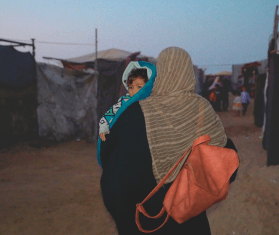Last updated on October 21, 2024
After months of exchanging fire over the border, Israeli forces launched a military offensive against the Lebanese armed group Hezbollah in September. Here’s what that means for people in Lebanon and how Doctors Without Borders/Médecins Sans Frontières (MSF) is responding to the growing health and humanitarian needs.
Where is Lebanon?
Lebanon is a small Middle Eastern country on the Mediterranean coast, bordering Israel to the south and Syria to the north and east. It has a population of 5.2 million people, including 400,000 Palestinian refugees and 1.5 million Syrian refugees.
Where is the conflict taking place?
The conflict between Israeli forces and the Lebanese group Hezbollah is mostly concentrated in southern Lebanon, however Israeli strikes have also hit the Bekaa valley and the southern suburbs of Beirut, the country’s capital, and surrounding areas.
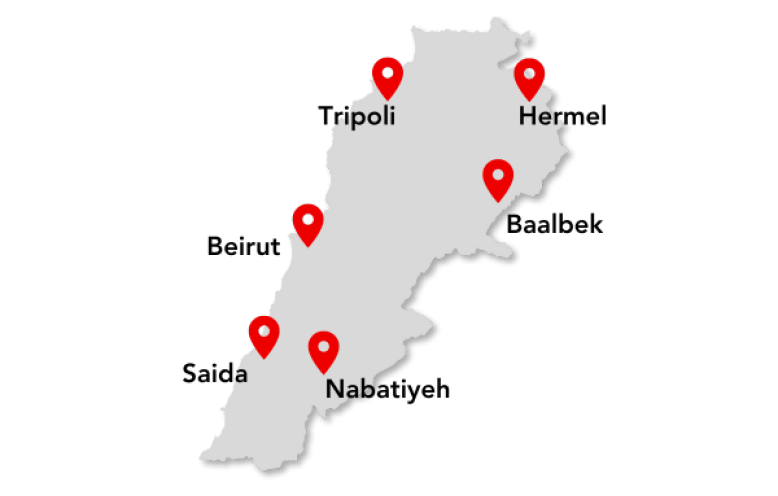
Lebanon at a glance
5.2 million
total population
1.9 million
refugees
100,000+
internally displaced
What’s happening in Lebanon right now?
Clashes at the border with Israel have escalated
Since the war in Gaza began in October 2023, Hezbollah and Israeli forces have been exchanging fire across the border between southern Lebanon and northern Israel. The violence escalated dramatically when Israel launched coordinated pager and walkie-talkie explosions in Beirut and other parts of Lebanon on September 18 and 19, before launching a full-scale military assault on September 23. To date, more than 2,000 people have been killed and about 10,000 wounded.
Mass displacement in the south
The escalation of violence has displaced more than 1.2 million people, according to Lebanese authorities, including more than 112,000 people displaced by fighting in the months prior. Many have fled their homes without any possessions and are struggling to access basic needs such as food and blankets in shelters, including makeshift shelters, schools, and abandoned buildings. In the border town of Al-Merouaniye, dozens of families are sheltering in an abandoned hotel.
Years of economic crisis
Lebanon was already in the midst of a dire humanitarian and economic crisis before the escalation began, with two out of three people living in poverty and an overburdened and overstretched health care system facing increasing pressure. For many, health services are out of reach due to the cost of transportation and the cost of care. Refugees face an additional barrier to accessing care: fear of deportation.
Why is what’s happening in Lebanon important?
MSF is gravely concerned about Israel’s bombing campaign in Lebanon, much of which is taking place in densely populated urban areas. The conflict’s potential to expand across the region, and the large number of vulnerable refugees in the crossfire, makes an immediate de-escalation of hostilities even more critical to prevent further suffering, injury, and loss of life.
"People who left their homes need all kinds of support," said Maram Sukkariyeh, a health promotion supervisor with MSF. "Everyone is scared and worried and no one knows where to seek safety. With every strike, people are losing their lives, including children. The future is unknown and deciding what to do is very difficult. Everyone seeks safety for their families and children."
What are the medical needs in Lebanon?
In addition to more than 2,000 people killed by Israeli bombardment, thousands have been left with severe injuries, often requiring surgical care. Many people are traumatized from losing their homes and loved ones, affecting their mental health. MSF staff have seen an increase in depression and anxiety disorders among displaced people in recent months, especially among those who have been displaced for prolonged periods of time.
"People are really good at coping with short-term stress, but what we see here is families who have been displaced from their homes for over five months and are living with a lot of uncertainty around when—and even if—they might be able to go back," said Felicitas Steinhoff, MSF's mental health activity manager.
In addition to medical and mental health care, displaced people are in need of basic supplies like mattresses and hygiene products, as the shelters and schools currently housing them are not prepared to accommodate so many people.
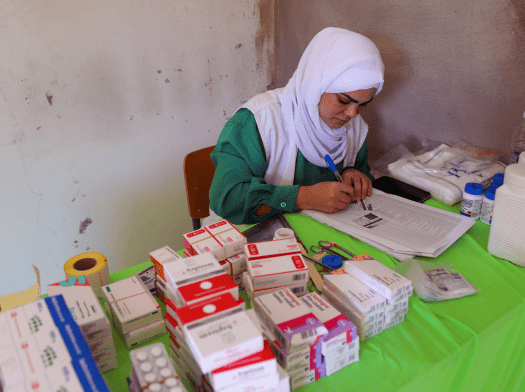
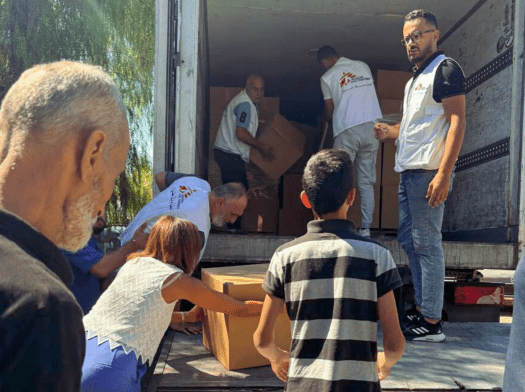
Hala Hussein, MSF dispenser, receives patients after their consultations to give them their prescribed medications (left); MSF teams unload medical supplies and other essential items to support the needs of people affected by the escalation of violence. Lebanon 2024 © Salam Daoud/MSF
How is MSF responding in Lebanon?
To help fill the gaps, MSF teams are distributing supplies, running mobile health clinics, and stepping up mental health efforts to respond to the needs of displaced people. MSF mobile clinics recently visited two locations in Mount Lebanon where displaced people have taken shelter to provide medical and mental health consultations. MSF also donated essential items including mattresses, blankets, and hygiene kits to displaced people in eight sites in Saida and Tripoli. Additionally, after being forced to halt activities on September 23 due to the immense and sudden deterioration of the security situation, MSF reopened its clinic in Baalbek-Hermel to provide patients with much-needed medications for chronic conditions. Mental health helplines run by MSF are receiving over 100 calls a day from people experiencing rising mental health needs.
Update from #Lebanon: "No one knows where to seek safety"
The latest from Lebanon
October 21 01:11 PM
A helpline to help people cope with war in Lebanon
MSF teams in Lebanon have launched a helpline to reach people unable to access care in person due to heavy bombardments and movement restrictions.
Read more
October 10 10:27 AM
Civilians and medical staff in Lebanon must be protected amid Israeli bombardment
MSF is working to ensure the continuation of health care in its existing facilities, while also scaling up and adapting activities.
Read more
September 26 01:15 PM
MSF scales up response in Lebanon as bombings continue
An immediate de-escalation of hostilities is critical to prevent further suffering, injury, and loss of life.
Read more
September 24 11:42 AM
Lebanon: MSF responds to humanitarian needs amid military escalation
Teams are distributing supplies, running mobile health clinics, and stepping up mental health efforts.
Read more
June 27 11:41 AM
Displaced in South Lebanon: Stories of people uprooted by escalating conflict
MSF is responding to the needs of people displaced from southern Lebanon amid a dire humanitarian and economic crisis.
Read more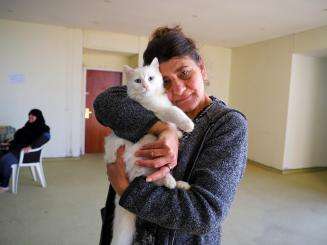
October 04 09:41 AM
Urgent need for assistance as Israeli bombardment causes unprecedented displacement in Lebanon
More than 70 percent of shelters across Lebanon are full, and humanitarian needs are dire among more than 1 million people displaced.
Read more



